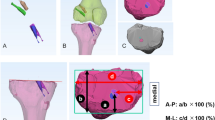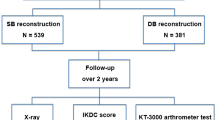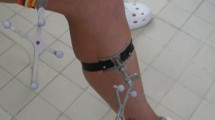Abstract
Based on biomechanical cadaver studies, anatomic double-bundle reconstruction of the anterior cruciate ligament (ACL) was introduced to achieve better stability in the knee, particularly in respect of rotatory loads. Previously, the success of ACL reconstruction was believed to be mainly dependent on correct positioning of the graft, irrespective of the number of reconstructed bundles for which computer-assisted surgery was developed to avoid malpositioning of the tunnel. The aim of the present study is to compare rotational and translational stability after computer-navigated standard single-bundle, and anatomic double-bundle ACL reconstruction. The authors investigated 55 consecutive patients who had undergone the single-bundle or double-bundle ACL reconstruction procedure with the use of autogenous hamstring tendon grafts and EndoButton® fixation, and the patients had been followed for a minimum period of 24 months. Intraoperative, anteroposterior and rotational laxity was measured with the computer navigation system, and compared between groups. Both surgical procedures significantly reduced anteroposterior displacement (AP) and internal rotation (IR) of the tibia compared to the pre-operative ACL-deficient knee (P < 0.05). No significant differences were registered between groups with regard to anteroposterior displacement of the tibia. A significantly greater reduction in internal rotation was noted in the double-bundle group (15.6°) compared to the single-bundle group (7.1°). The IKDC and Lysholm score were significantly higher in the double-bundle group. However, the results were excellent in both groups. The use of a computer-assisted ACL reconstruction, which is a highly accurate method of graft placement, could be useful for inexperienced surgeons to avoid malposition. Whether double-bundle ACL reconstruction, which was associated with improved rotational laxity and significantly better IKDC and Lysholm scores compared to the standard single-bundle ACL reconstruction procedure, provide an influence in terms of avoiding osteoarthritis or meniscus degeneration, long-term results of at least 5 years are needed.




Similar content being viewed by others
References
Adachi N, Ochi M, Uchio Y et al (2004) Reconstruction of the anterior cruciate ligament: a single- versus double-bundle multistranded hamstring tendons. J Bone Joint Surg Br 86:515–520
Aglietti P, Giron F, Buzzi R et al (2004) Anterior cruciate ligament reconstruction: bone-patellar tendon bone compared with double semitendinosus and gracilis tendon grafts: a prospective randomized clinical trial. J Bone Joint Surg Am 86:2143–2155
Aglietti P, Giron F, Cuomo P et al (2007) Single- and double-incision double-bundle ACL reconstruction. Clin Orthop Relat Res 454:108–113
Amis A, Bull AMJ, Lie DT (2005) Biomechanics of rotational instability and anatomic anterior cruciate ligament reconstruction. Oper Tech Orthop 15:29–35
Anderson AF, Snyder RB, Lipscomb AB Jr (2001) Anterior cruciate ligament reconstruction. A prospective randomized study of three surgical methods. Am J Sports Med 29:272–279
Boden B, Griffin L, Garrett W (2000) Etiology and prevention of noncontact ACL injury. Phys Sports Med 28:1–14
Brandsson S, Karlsson J, Swärd L et al (2002) Kinematics and laxity of the knee joint after anterior anterior cruciate ligament reconstruction: pre- and postoperative radiostereometric studies. Am J Sports Med 30:361–367
Buoncristiani AM, Tjoumakaris FP, Starman JS et al (2006) Anatomic double-bundle anterior cruciate ligament reconstruction. Arthroscopy 22:1000–1006
Caborn DN, Chang HC (2005) Single femoral socket double-bundle anterior cruciate ligament reconstruction using tibialis anterior tendon: description of a new technique. Arthroscopy 21:1273
Colombet P, Robinson J, Christel P et al (2007) Using navigation to measure rotation kinematics during ACL reconstruction. Clin Orthop Relat Res 454:59–65
Crawford C, Nyland J, Landes S et al (2007) Anatomic double bundle ACL reconstruction: a literature review. Knee Surg Sports Traumatol Arthrosc 15:946–964
Daniel DM, Stone ML, Dobson BE et al (1994) Fate of the ACL-injured patient: a prospective outcome study. Am J Sports Med 22:632–644
Ejerhed L, Kartus J, Sernert N et al (2003) Patellar tendon or semitendinosus tendon autografts for anterior ligament reconstruction? A prospective randomized study with a two-year follow-up. Am J Sports Med 31:19–25
Freedman KB, D’Amato MJ, Nedeff DD et al (2003) Arthroscopic anterior cruciate ligament reconstruction: a metaanalysis comparing patellar tendon and hamstring tendon autografts. Am J Sports Med 31:2–11
Gabriel MT, Wong EK, Woo SL et al (2004) Distribution of in situ forces in the anterior cruciate ligament in response to rotatory loads. J Orthop Res 22:85–89
George MS, Dunn WR, Spindler KP (2006) Current concepts review: revision anterior cruciate ligament reconstruction. Am J Sports Med 20:26–2037
Girgis FG, Marshal JL, Monajem A (1975) The cruciate ligaments of the knee joint; anatomical, functional and experimental analysis. Clin Orthop Relat Res 106:216–231
Hefti F, Müller W (1993) Current state of evaluation of knee ligament lesions. The new IKDC knee evaluation form. Orthopäde 22:351–362
Ishibashi Y, Tsuda E, Tazawa K et al (2005) Intraoperative evaluation of the anatomical double-bundle anterior cruciate ligament reconstruction with the OrthoPilot navigation system. Orthopedics 28:1277–1282
Kocher MS, Steadman JR, Briggs KK, et al (2004) Relationships between objective assessment of ligament stability and subjective assessment of symptoms and function after anterior cruciate ligament reconstruction. Am J Sports Med 32:629–634
Kodali P, Yang S, Koh J (2008) Computer-assisted surgery for anterior cruciate ligament reconstruction. Sports Med Arthrosc 16:67–76
Koh J (2005) Computer-assisted navigation and anterior cruciate ligament reconstruction: accuracy and outcomes. Orthopedics 28:1283–1287
Laxdal G, Kartus J, Hansson L et al (2005) A prospective randomized comparison of bone-patellar tendon-bone and hamstring grafts for anterior cruciate ligament reconstruction. Arthroscopy 15:34–42
Lopomo N, Zaffagnini S, Bignozzi S, et al (2009) Pivot-shift test: analysis and quantification of knee laxity parameters using a navigation system. J Orthop Res. doi:10.1002/jor.20966
Lysholm J, Gillquist J (1982) Evaluation of knee ligament surgery results with special emphasis on use of a scoring scale. Am J Sports Med 10:150–153
Mae T, Shino K, Miyama T (2001) Single- versus two-femoral socket anterior cruciate ligament reconstruction technique: biomechanical analysis using a robotic simulator. Arthroscopy 17:708–716
Marcacci M, Molgora AP, Zaffagnini S et al (2003) Anatomic double-bundle anterior cruciate ligament reconstruction with hamstrings. Arthroscopy 19:540–546
Meredick RB, Kennan JV, Appleby D et al (2007) Outcome of single-bundle versus double-bundle reconstruction of the anterior cruciate ligament. Am J Sports Med 36:1414–1421
Picard F, Digioia AM, Moody J et al (2001) Accuracy in tunnel placement for ACL reconstruction. Comparison of traditional arthroscopic and computer-assisted navigation techniques. Comput Aided Surg 6:279–289
Sakane M, Fox RJ, Woo SL et al (1997) In situ forces in the anterior cruciate ligament and its bundles in response to anterior tibial loads. J Orthop Res 15:285–293
Steckel H, Starman JS, Baums MH, Klinger HM, Schultz W, Fu FH (2007) The double-bundle technique for anterior cruciate ligament reconstruction: a systematic overview. Scand J Med Sci Sports 17:99–108
Tashman S, Collon D, Anderson K et al (2004) Abnormal rotational motion during running after anterior cruciate ligament reconstruction. Am J Sports Med 32:975–983
Tegner Y, Lysolm J (1985) Rating systems in the evaluation of knee ligament injuries. Clin Orthop Relat Res 198:43–49
Yagi M, Kuroda R, Nagamune K et al (2006) Double-bundle ACL reconstruction can improve rotational stability. Clin Orthop Relat Res 454:100–107
Yagi M, Wong EK, Kanamori A et al (2002) Biochemical analysis of an anterior cruciate ligament reconstruction. Am J Sports Med 30:660–666
Yasuda K, Kondo E, Ichiyama H et al (2006) Clinical evaluation of anatomic double-bundle anterior cruciate ligament reconstruction procedure using hamstring tendon grafts: comparisons among 3 different procedures. Arthroscopy 22:240–251
Zelle BA, Vidal AF, Brucker PU et al (2007) Double-bundle reconstruction of the anterior cruciate ligament: anatomic and biomechanical rationale. J Am Acad Orthop Surg 15:87–96
Author information
Authors and Affiliations
Corresponding author
Rights and permissions
About this article
Cite this article
Hofbauer, M., Valentin, P., Kdolsky, R. et al. Rotational and translational laxity after computer-navigated single- and double-bundle anterior cruciate ligament reconstruction. Knee Surg Sports Traumatol Arthrosc 18, 1201–1207 (2010). https://doi.org/10.1007/s00167-009-0992-9
Received:
Accepted:
Published:
Issue Date:
DOI: https://doi.org/10.1007/s00167-009-0992-9




